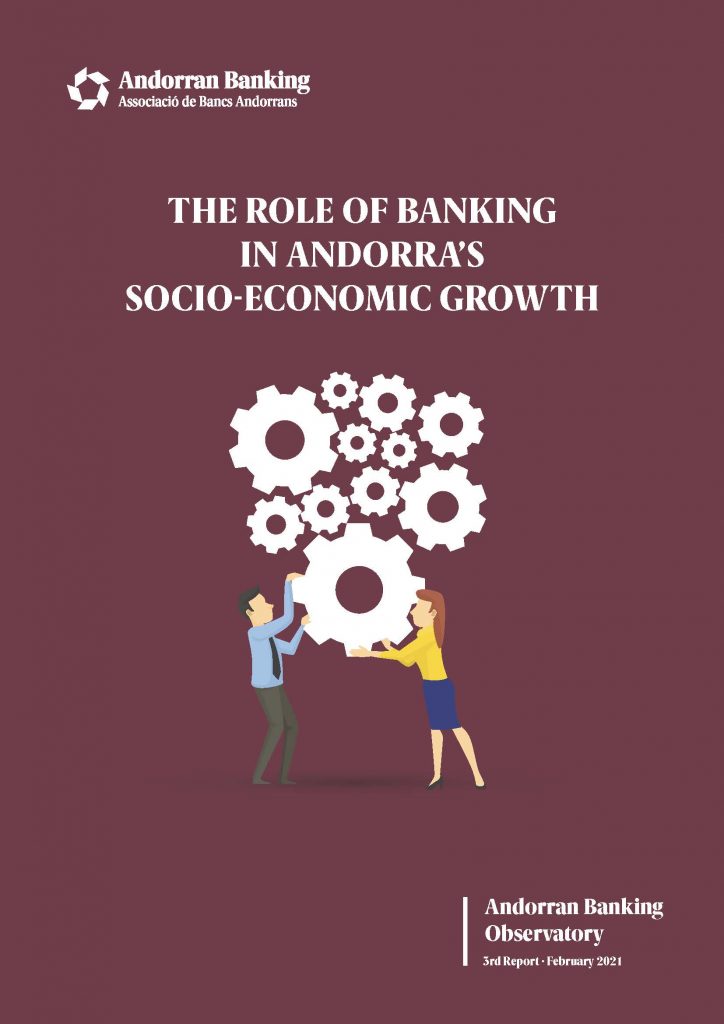
- The third report of the Andorran Banking Observatory stresses the importance for Andorra of having its own financial system for the development of the local economy
- The financial sector accounts for nearly 20% of GDP and provides direct, permanent and qualified jobs to 5% of the country’s workforce
- Andorran banks provide credit to businesses (49%) and households (33%)
- During the COVID-19 crisis, the banking sector has shown that it is part of the solution, acting as a facilitator to ensure the country’s stability
Through its platform the Andorran Banking Observatory, Andorran Banking has prepared a new report that highlights the importance of having an independent banking system and the role that it plays in the country’s socioeconomic development, especially in the current pandemic context.
Financing to help the country move forward
Financing is one of the main functions of the banking sector and one of the areas where banks play a significant role in society by helping businesses, individuals and families carry out their projects. Andorran banks are especially well positioned to contribute to the financing of the real economy thanks to the liquidity surplus generated by the private banking business, which allows banks to grant more credit than would be expected from a country the size of Andorra.
The third report of the Andorran Banking Observatory details the distribution of the €6bn worth of credit granted by Andorra’s five financial institutions, with 49% being provided to businesses, 33% to households and 4% to the financing of the government. The remaining 14% is earmarked for Lombard loans, a type of loan that is offered to private banking clients using their investment portfolios as collateral. As far as support to the government is concerned, 10 years ago the Andorran government was financed exclusively through the country’s banks, but the recent diversification of Andorra’s debt has reduced the weight supported by Andorran banks to 51.8%. This diversification has been made possible by the issuance of debt both domestically and, more recently, internationally.
In addition to its role in financing the economy, the banking sector also contributes to the economic development of Andorra by generating skilled jobs. Banks currently provide permanent and qualified employment to 5% of Andorra’s workforce and their activity accounts for almost 20% of Gross Domestic Product (GDP).
Social work
Every bank in Andorra, including Andorran Banking as an association, runs programmes that aim to give back to society through social projects and support to cultural and sports organisations. Andorran banks dedicate up to 6% of their profits to Corporate Social Responsibility actions. In recent years, the banking sector has contributed €5m a year to society through social aid, sports sponsorships and support schemes aimed at a number of foundations. The taxes levied on banking activities also provide an important contribution to the functioning of the State and its social policies.
The role of banking in the crisis caused by COVID-19
The general manager of Andorran Banking, Esther Puigcercós, stresses that “the sector has been part of the solution during this crisis, thanks to the solvency and liquidity enjoyed by financial institutions as a result of the international standardisation process undertaken in the last decade”. The publication goes on to explain that financial institutions have been a transmission belt for soft loans and legislative moratoria, and that these measures have been complemented with wider sectorial moratoria to reach out to more families and companies with difficulties.
Andorran banks have granted €134m of state-guaranteed soft loans, providing liquidity to businesses and individuals in an effort to overcome the crisis, and have processed more than 350 moratoria on loans totalling an outstanding balance of nearly €122m. They have worked alongside the government to provide solutions and funding to meet the immediate needs arising from the pandemic.
The challenges for the future of Andorran banks
The health crisis has caught the Andorran banking sector in a moment of transformation in which it faces many challenges, including a change of business model, a negative interest rate scenario, new demands from customers and new competitors, etc., leading the sector to strengthen itself. The report describes each of these challenges and how they are being addressed through the added value services provided by financial institutions, Andorran banks’ capacity for resilience and their great potential for solvency and liquidity. However, the report also stresses that, in order to maintain the sector’s stability and competitiveness, and in view of the future association agreement between Andorra and the European Union, there is a need to ensure that the European Central Bank becomes the system’s lender of last resort. Moreover, Andorran Banking requests that the exclusion of banking activities from the EU passporting system be maintained as long as Andorran banks cannot compete on a level playing field with major European banks. Indeed, according to Esther Puigcercós, “the stability of the Andorran financial sector is a factor of great importance, not only for economic growth and the development of society, but also to ensure the sustainability and sovereignty of Andorra”.
About Andorran Banking
Founded in 1960, the Association of Andorran Banks brings together and represents the interests of Andorra’s financial institutions, promotes compliance with good banking practices and promotes initiatives aimed at improving industry standards.
The Andorran Banking Observatory is a new platform created at the end of 2019 whose main aim is to prepare periodic reports on topics of interest so as to inform the general public about the activities carried out by Andorran banks and overall trends in the banking sector. The first two publications addressed the digital transformation of Andorran banks and the strategy for the sustainable development of the banking sector.
To download the report, click on the image:

